5 start with W start with W
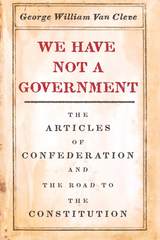
In George William Van Cleve’s book, we encounter a sharply divided America. The Confederation faced massive war debts with virtually no authority to compel its members to pay them. It experienced punishing trade restrictions and strong resistance to American territorial expansion from powerful European governments. Bitter sectional divisions that deadlocked the Continental Congress arose from exploding western settlement. And a deep, long-lasting recession led to sharp controversies and social unrest across the country amid roiling debates over greatly increased taxes, debt relief, and paper money. Van Cleve shows how these remarkable stresses transformed the Confederation into a stalemate government and eventually led previously conflicting states, sections, and interest groups to advocate for a union powerful enough to govern a continental empire.
Touching on the stories of a wide-ranging cast of characters—including John Adams, Patrick Henry, Daniel Shays, George Washington, and Thayendanegea—Van Cleve makes clear that it was the Confederation’s failures that created a political crisis and led to the 1787 Constitution. Clearly argued and superbly written, We Have Not a Government is a must-read history of this crucial period in our nation’s early life.
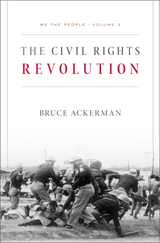
The Civil Rights Revolution carries Bruce Ackerman’s sweeping reinterpretation of constitutional history into the era beginning with Brown v. Board of Education. From Rosa Parks’s courageous defiance, to Martin Luther King’s resounding cadences in “I Have a Dream,” to Lyndon Johnson’s leadership of Congress, to the Supreme Court’s decisions redefining the meaning of equality, the movement to end racial discrimination decisively changed our understanding of the Constitution.
“The Civil Rights Act turns 50 this year, and a wave of fine books accompanies the semicentennial. Ackerman’s is the most ambitious; it is the third volume in an ongoing series on American constitutional history called We the People. A professor of law and political science at Yale, Ackerman likens the act to a constitutional amendment in its significance to the country’s legal development.”
—Michael O’Donnell, The Atlantic
“Ackerman weaves political theory with historical detail, explaining how the civil rights movement evolved from revolution to mass movement and then to statutory law…This fascinating book takes a new look at a much-covered topic.”
—Becky Kennedy, Library Journal
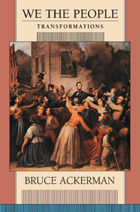
Constitutional change, seemingly so orderly, formal, and refined, has in fact been a revolutionary process from the first, as Bruce Ackerman makes clear in We the People: Transformations. The Founding Fathers, hardly the genteel conservatives of myth, set America on a remarkable course of revolutionary disruption and constitutional creativity that endures to this day. After the bloody sacrifices of the Civil War, Abraham Lincoln and the Republican Party revolutionized the traditional system of constitutional amendment as they put principles of liberty and equality into higher law. Another wrenching transformation occurred during the Great Depression, when Franklin Roosevelt and his New Dealers vindicated a new vision of activist government against an assault by the Supreme Court.
These are the crucial episodes in American constitutional history that Ackerman takes up in this second volume of a trilogy hailed as "one of the most important contributions to American constitutional thought in the last half-century" (Cass Sunstein, New Republic). In each case he shows how the American people--whether led by the Founding Federalists or the Lincoln Republicans or the Roosevelt Democrats--have confronted the Constitution in its moments of great crisis with dramatic acts of upheaval, always in the name of popular sovereignty. A thoroughly new way of understanding constitutional development, We the People: Transformations reveals how America's "dualist democracy" provides for these populist upheavals that amend the Constitution, often without formalities.
The book also sets contemporary events, such as the Reagan Revolution and Roe v. Wade, in deeper constitutional perspective. In this context Ackerman exposes basic constitutional problems inherited from the New Deal Revolution and exacerbated by the Reagan Revolution, then considers the fundamental reforms that might resolve them. A bold challenge to formalist and fundamentalist views, this volume demonstrates that ongoing struggle over America's national identity, rather than consensus, marks its constitutional history.
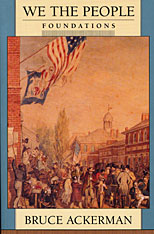
Bruce Ackerman offers a sweeping reinterpretation of our nation’s constitutional experience and its promise for the future. Integrating themes from American history, political science, and philosophy, We the People confronts the past, present, and future of popular sovereignty in America. Only this distinguished scholar could present such an insightful view of the role of the Supreme Court. Rejecting arguments of judicial activists, proceduralists, and neoconservatives, Ackerman proposes a new model of judicial interpretation that would synthesize the constitutional contributions of many generations into a coherent whole. The author ranges from examining the origins of the dualist tradition in the Federalist Papers to reflecting upon recent, historic constitutional decisions. The latest revolutions in civil rights, and the right to privacy, are integrated into the fabric of constitutionalism. Today’s Constitution can best be seen as the product of three great exercises in popular sovereignty, led by the Founding Federalists in the 1780s, the Reconstruction Republicans in the 1860s, and the New Deal Democrats in the 1930s.
Ackerman examines the roles played during each of these periods by the Congress, the Presidency, and the Supreme Court. He shows that Americans have built a distinctive type of constitutional democracy, unlike any prevailing in Europe. It is a dualist democracy, characterized by its continuing effort to distinguish between two kinds of politics: normal politics, in which organized interest groups try to influence democratically elected representatives; and constitutional politics, in which the mass of citizens mobilize to debate matters of fundamental principle. Although American history is dominated by normal politics, our tradition places a higher value on mobilized efforts to gain the consent of the people to new governing principles. In a dualist democracy, the rare triumphs of constitutional politics determine the course of normal politics.
More than a decade in the making, and the first of three volumes, We the People, Volume 1: Foundations speaks to all who seek to renew and redefine our civic commitments in the decades ahead.
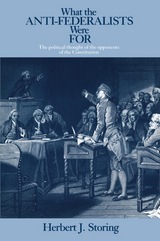
Storing here offers a brilliant introduction to the thought and principles of the Anti-Federalists as they were understood by themselves and by other men and women of their time. His comprehensive exposition restores to our understanding the Anti-Federalist share in the founding its effect on some of the enduring themes and tensions of American political life. The concern with big government and infringement of personal liberty one finds in the writings of these neglected Founders strikes a remarkably timely note.
READERS
Browse our collection.
PUBLISHERS
See BiblioVault's publisher services.
STUDENT SERVICES
Files for college accessibility offices.
UChicago Accessibility Resources
home | accessibility | search | about | contact us
BiblioVault ® 2001 - 2024
The University of Chicago Press









